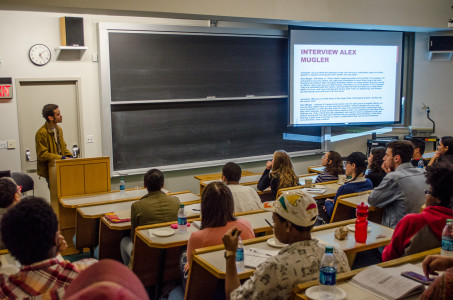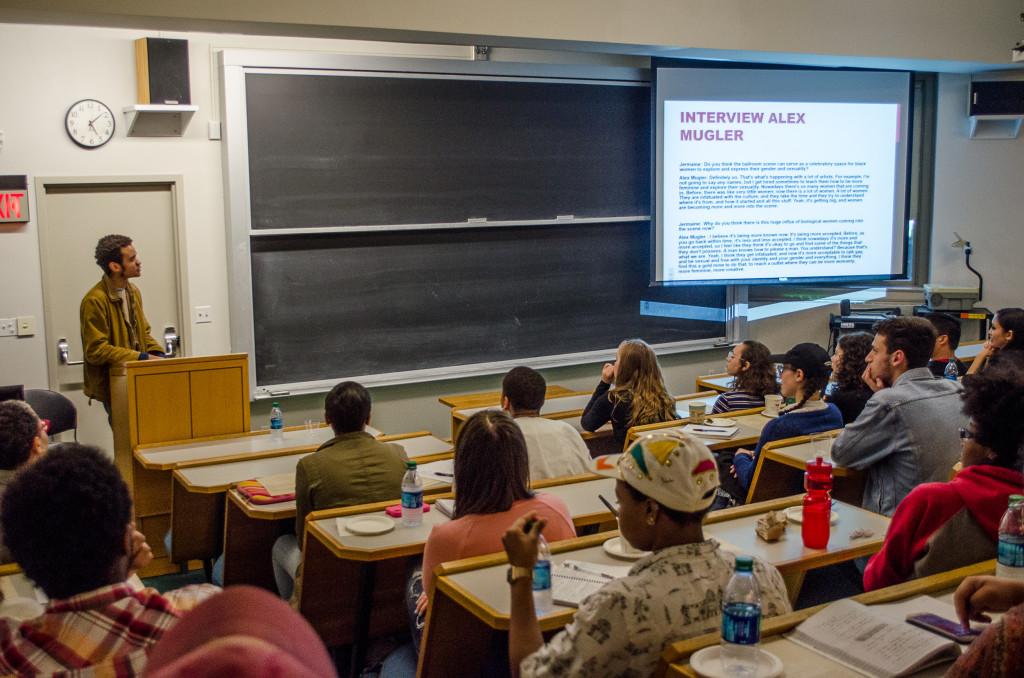Ronnie Ruse
rusevero@grinnell.edu
On Tuesday, three recipients of the Mellon Mays Undergraduate Fellowship (MMUF) delivered their senior research presentations to a packed house, showcasing research collected over the course of two years in the program. On average, five fellows are selected every year; there are usually about ten fellows on Grinnell’s campus in any given year.
Broadly stated, the goal of MMUF is to diversify the faculty ranks at institutions of higher learning.
“Mellon is a pipeline program. It’s about increasing the number, particularly of students of color, who go on to pursue a Ph.D. first and foremost, and then a career in the professoriate,” MMUF Program Coordinator and Mellon fellow Shanna Benjamin said. “The idea is that if we increase the number of students who are thinking about a life of the mind, then we can begin to transform academic spaces into places that are more inclusive.”
The first Mellon fellow to present on Tuesday was Alex Odom ’16. Her research focused on shifting the focus of the civil rights movement away from male leaders, marches and picket lines, and on to the lesser known local female leaders.
Jermaine Stewart-Webb ’16 presented next. His research focused on how ballroom scenes create a temporary environment where black women can escape the judgment of the heteronormative white audience and be part of a sex positive and celebratory space.

Connie Wang ’16 was the last fellow presenting. Her project discussed the philosophical implications of granting legal rights to nature, as happened recently in Ecuador where a couple filed a lawsuit on behalf of nature.
The presentations were by senior Mellon fellows who are graduating this spring, and next year a new group of fellows will take their places. Students apply their sophomore year and spend junior and senior year working on research.
Abdiel Lopez ’18, part of the newest class of rising Mellon fellows, believes that the Mellon Mays program can offer many advantages to students, especially first-generation students.
“[Mellon offers] mentoring, networking, knowing the how-to’s of academia, knowing what kind of scholarship I should be producing, knowing what grad schools I should be applying to and how to choose a grad school program, funding for travel and research, conferences and help navigating around this foreign space,” Lopez said.
In addition to a support system, Mellon Mays also gives students a way to do more in-depth research than allowed by a typical three-month Mentored Advanced Project (MAP).
“In my classes, I would get ideas about things and I didn’t have the space or the time within those courses to explore them,” said Nadiri Saunders ’17, another rising Mellon fellow. “Professor Benjamin told me I should pursue [a fellowship] if I’m interested in doing a two-year research project, and I was, and I was passionate about the idea of having the support of professors and peers who were also interested in doing independent work outside of what I was doing in my classes.”
The combination of mentorship, teamwork and research independence make Mellon Mays a unique program at Grinnell.
“Even though almost all of us are from different disciplines and we want to get Ph.D.s in different things, [Mellon] was the first time where I was actually in a community with people who wanted to do the same thing that I was thinking of doing,” Wang said.
Mellon mirrors the mentorship models of other multicultural groups on campus, such as Posse, while building on Grinnell’s tradition of rigorous undergraduate education.
“We’ve had a wonderful relationship with Posse, but I think that more broadly, Mellon dovetails into the institution’s current interest in undergraduate research,” Benjamin said. “I think that in some respects it serves as a model of the best that Grinnell does in terms of advising and mentoring their undergraduates to pursue research and to ask original questions.”





























































